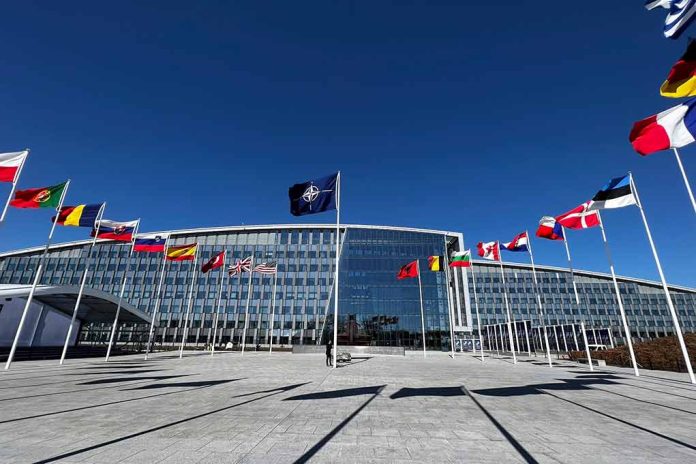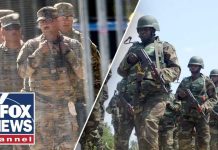
Russia has drawn a new line in the sand for ending the Ukraine war – NATO must withdraw from the Baltic states before any resolution can be achieved.
Key Takeaways
- Russia’s Deputy Foreign Minister Sergei Ryabkov explicitly linked NATO’s Baltic presence to the continuation of the Ukraine conflict
- NATO is conducting extensive maritime exercises in the Baltic Sea with 17 countries and 50 vessels amid growing tensions
- Russia’s “ghost fleet” of aging vessels is suspected of conducting covert intelligence gathering and potential sabotage operations
- European NATO members are being pressured to increase defense spending and capabilities as US focus shifts toward the Indo-Pacific
- Russia views NATO’s eastward expansion, particularly the recent additions of Sweden and Finland, as the fundamental cause of the conflict
Russia’s Ultimatum: NATO Baltic Withdrawal or Continued War
In a significant escalation of rhetoric, Russian Deputy Foreign Minister Sergei Ryabkov has declared that NATO’s military presence in the Baltic region is the primary obstacle to resolving the Ukraine conflict. His statement represents a dramatic shift in the Kremlin’s position, explicitly connecting the roots of the war to NATO’s eastward expansion rather than focusing solely on Ukraine’s potential NATO membership. This broader challenge to the Alliance’s role in Eastern Europe has created a major impediment to peace negotiations at a time when President Trump has expressed commitment to ending the conflict.
“The American side requires practical steps aimed at eliminating the root causes of the fundamental contradictions between us in the area of security. Among these causes, NATO expansion is in the foreground. Without resolving this fundamental and most acute problem for us, it is simply impossible to resolve the current conflict in the Euro-Atlantic region,” said Sergei Ryabkov, Russia’s Deputy Foreign Minister.
Baltic Sea Becomes Flashpoint as Military Exercises Intensify
NATO is currently conducting extensive maritime exercises in the Baltic Sea, involving 17 countries and 50 vessels under the leadership of the U.S. Navy’s 6th Fleet. The BALTOPS exercise explicitly aims to ensure cooperation among Baltic Sea nations—pointedly excluding Russia—to defend the strategically vital region. These exercises come amid heightened concerns over Russia’s activities in Baltic waters, particularly following several incidents involving damaged undersea communication cables that are crucial to regional security and economic stability.
“This year’s BALTOPS is more than just an exercise. It’s a visible demonstration of our Alliance’s resolve, adaptability and maritime strength,” said U.S. Vice Admiral J.T. Anderson.
Adding to tensions is Russia’s deployment of what NATO officials call a “ghost” or “shadow” fleet—aging vessels suspected of conducting covert operations including intelligence gathering and potentially sabotage. The seriousness of these concerns was underscored when three crew members from a Russian-linked vessel were charged in Finland for damaging an undersea cable. The narrow waterways and heavy maritime traffic in the Baltic Sea create conditions where miscalculations could rapidly escalate into broader conflicts.
NATO’s Strategic Realignment Amid Russian Threats
The Alliance faces significant challenges in its deterrence posture, with European members being urged to take greater responsibility for their own defense. NATO’s current defense capabilities heavily rely on US military support, particularly in intelligence, surveillance, reconnaissance, and strategic assets. With American priorities shifting increasingly toward the Indo-Pacific region, European allies are under pressure to rapidly increase their military capabilities and spending to counter the persistent Russian threat on their doorstep.
“Russia has been and will likely remain a chronic threat to NATO,” said General Christopher Cavoli, highlighting the enduring nature of the challenge.
NATO analysts project that by 2027, European NATO states should develop the capability to independently defend their northeastern border, but this requires significant investments and a shift from national-centric approaches to an Alliance-wide defense mindset. The growing Russia-China partnership adds another layer of complexity to NATO’s strategic calculations, particularly as both countries increase military cooperation and coordinate diplomatic positions that challenge Western interests. This evolving partnership has significant implications for global security dynamics and NATO’s operational reach.
Trump’s Presidency: A New Opening for Negotiations?
Ryabkov’s comments came with an acknowledgment that President Trump’s return to the White House and his stated commitment to resolving the Ukraine conflict diplomatically has created “cautious optimism” in Moscow regarding potential normalization of relations. This suggests Russia may be positioning itself for negotiations with the Trump administration by clearly articulating its maximum demands—including the withdrawal of NATO forces from the Baltic states—while expressing openness to diplomatic engagement.
“Trump’s return to the White House, declaring his commitment to a political and diplomatic settlement of the Ukrainian crisis, has become a reason for cautious optimism in terms of a potential normalization of relations with the United States, but also in a broader sense,” stated Sergei Ryabkov.
The stakes for NATO have risen dramatically since Russia’s invasion of Ukraine, with Sweden and Finland abandoning decades of neutrality to join the Alliance—exactly the kind of expansion that Moscow cites as provocation. This strategic shift in the Nordic countries has further strengthened NATO’s position in the Baltic region, but also intensified Russia’s perception of encirclement. As President Trump seeks to fulfill his campaign promise of bringing the Ukraine conflict to a resolution, these fundamentally opposed security perspectives present a significant diplomatic challenge.



